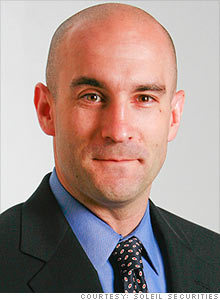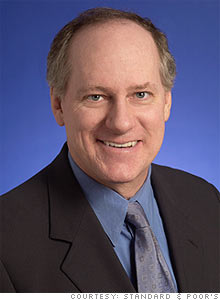Buy or sell a hotel recovery?
Shares of Starwood Hotels & Resorts have nearly tripled in value since March. Analysts debate whether they can continue rising.
 |
| The bull: Jake Fuller, Soleil Securities |
 |
| The bear: Mark Basham, Standard & Poor's |
| MMA | 0.69% |
| $10K MMA | 0.42% |
| 6 month CD | 0.94% |
| 1 yr CD | 1.49% |
| 5 yr CD | 1.93% |
NEW YORK (Fortune) -- With its focus on luxury hotels brands like the St. Regis and Westin, Starwood Hotels has been especially hurt by the downturn. The third largest U.S. hotel operator recently cut its 2009 earnings estimate, and CEO Frits van Paasschen expects a slow recovery.
Revenue per available room, the metric that reflects occupancy and the room rates hotels can charge, fell 34% in the last quarter at Starwood's North American hotels. Meanwhile, the company is cutting costs to make up for reduced bookings and selling some properties to raise cash. Yet its stock is up 190% since its March low of $9.52.
As Starwood (HOT, Fortune 500) braces for a long recovery, we asked two analysts if now is a good time to buy the stock.
"Obviously the near-term hotel environment is not great. My 'buy' rating is not necessarily a near-term trading call on the stock, but reflects a positive longer-term outlook. The favorable long-term view is based on three key factors.
"First, as a function of the credit market slowdown, we should see several years of decelerating hotel room supply growth. While supply should be up by 3% this year in the domestic market, all of those projects were funded when credit was readily available. With financing scarce, growth should slow to 1.5% in 2010 and less than 1% in the 2011-2013 period.
"I cannot say when demand may turn, but over a 3-5 year horizon we will see demand up and that will come as supply growth slows.
"The second point, and probably one that's less well understood by investors, is the impact of a de-emphasis of its timeshare business. Starwood, Marriott, Wyndham and Hilton had all aggressively built up timeshare over the last decade, but that is a capital intense, low-multiple business. As capital sources dried up, the hoteliers have cut back on timeshare with a reduction in sales infrastructure of 35-40% and a dramatic reduction in new development.
"While that has led to reduced near-term earnings, free cash flow is up. Starwood's timeshare business used about $300 million in cash last year, but should produce $30 million or more this year. That is capital that Starwood can redeploy into higher multiple businesses.
"Finally, we are seeing signs of stabilization. Our survey of August room-rate quotes for Starwood's U.S.-owned hotels showed a 4% increase from July. August quotes were surveyed twice (7/15 and 7/31) and over that 16-day span quotes were up 5%, suggesting that demand was firming. It may be early to call the bottom, but we are at least seeing signs that trends are no longer continuing to get worse.
"While I expect Starwood's North American [revenue per available room] to be down by 25% this year, expectations at this point are very low and that is reflected in both estimates and stock price. If our survey is on track, we may see Starwood meet or beat those low expectations.
"Based on our analysis of recovered earnings power, we derive a target price for Starwood stock of $35 in the next 12 months."
"My 'strong sell' rating on the stock is primarily an industry call. I don't expect a recovery for hotels for at least four years from when the downturn began in 2008, until 2012. A recovery means getting revenue per available room back to what it was in 2007.
"The industry has benefited from -- but it's also been cursed by -- very low interest rates since last September. That's allowed a lot of properties that wouldn't be economically viable to stay in business at a time when there is tremendous excess supply of rooms across almost all segments of the industry -- from luxury to economy. There are really just too many rooms right now. The industry is adding over 150,000 gross rooms, which is a more than 3% increase in the U.S.
"So with only a fairly moderate number of hotels closing, we're going to get closer to 3% supply growth this year, and 2% to 2.5% growth in 2010, when we really don't need any new rooms coming into the market.
"Overseas, where Starwood is getting a majority of their growth, things aren't that much different from the U.S. In those markets, growth, like the headline GDP numbers coming out of China, is probably less than meets the eye. The fiscal stimulus package that China enacted really boosted GDP growth above what it probably is at a sustainable rate. Anecdotally, I've heard there are hotels in Beijing that are half full during peak travels times.
"Starwood is also focused on the upscale luxury segments of the industry, which are doing worse than the industry on average. That's another strike against the company. Revenue per available room for the U.S. hotel industry is likely to be down 15.5% in 2009. For Starwood, that number is worse -- down about 20%.
"Some of that decline is because of its concentration on corporate travel. Corporate rates are being negotiated right now through October, and they're certainly going to try to get market rates or lower. That probably implies somewhere between 10% to 15% lower prices than their negotiated rates for last year because 2009 rates were almost done by the end of September. (The timing was fairly good for the hotel industry.)
"I think the market's expecting a V-shaped recovery in the hotel industry and I don't see that happening. I also think there's been a lot of confusion about seasonal patterns in the hotel industry and assuming that those are green shoots. Summer occupancy is usually 5% to 10% higher than the rest of the year on average across the industry. That's just normal seasonal patterns from vacations. A lot of people have been using that as a sign that the industry is going to have a fast recovery. I don't buy into that.
"I think the stock can fall to $14 in the next year." ![]()
-
 The retail giant tops the Fortune 500 for the second year in a row. Who else made the list? More
The retail giant tops the Fortune 500 for the second year in a row. Who else made the list? More -
 This group of companies is all about social networking to connect with their customers. More
This group of companies is all about social networking to connect with their customers. More -
 The fight over the cholesterol medication is keeping a generic version from hitting the market. More
The fight over the cholesterol medication is keeping a generic version from hitting the market. More -
 Bin Laden may be dead, but the terrorist group he led doesn't need his money. More
Bin Laden may be dead, but the terrorist group he led doesn't need his money. More -
 U.S. real estate might be a mess, but in other parts of the world, home prices are jumping. More
U.S. real estate might be a mess, but in other parts of the world, home prices are jumping. More -
 Libya's output is a fraction of global production, but it's crucial to the nation's economy. More
Libya's output is a fraction of global production, but it's crucial to the nation's economy. More -
 Once rates start to rise, things could get ugly fast for our neighbors to the north. More
Once rates start to rise, things could get ugly fast for our neighbors to the north. More








